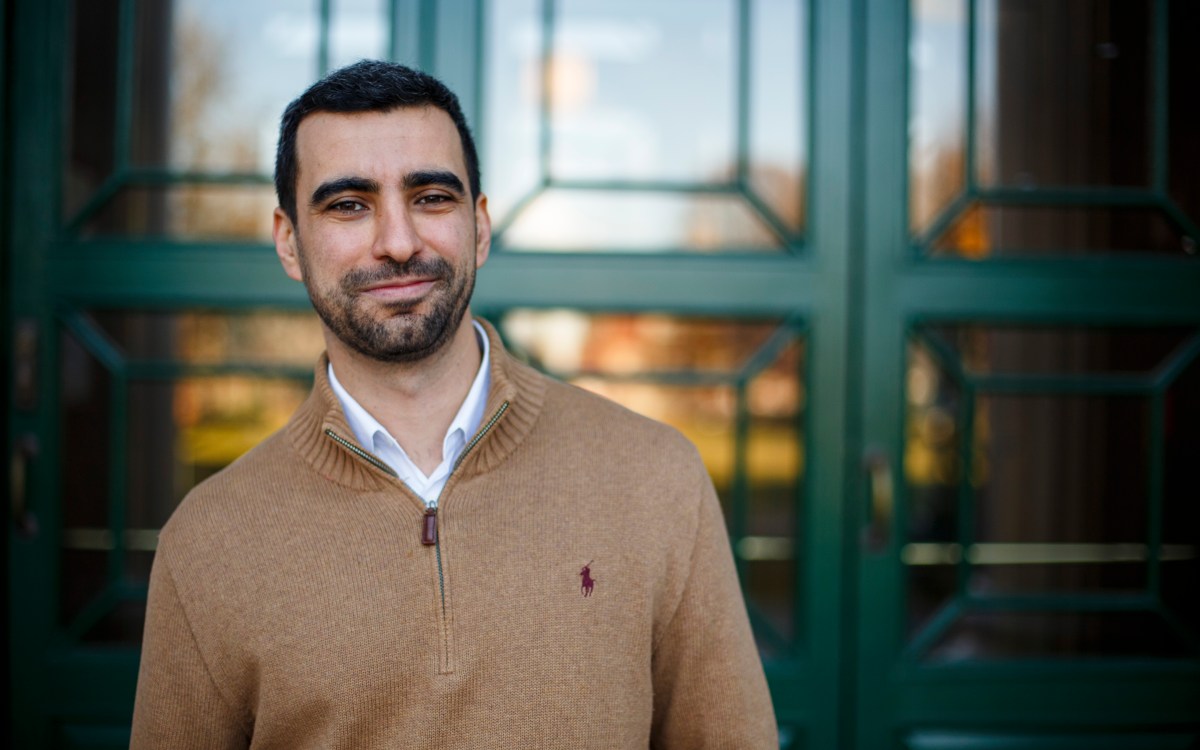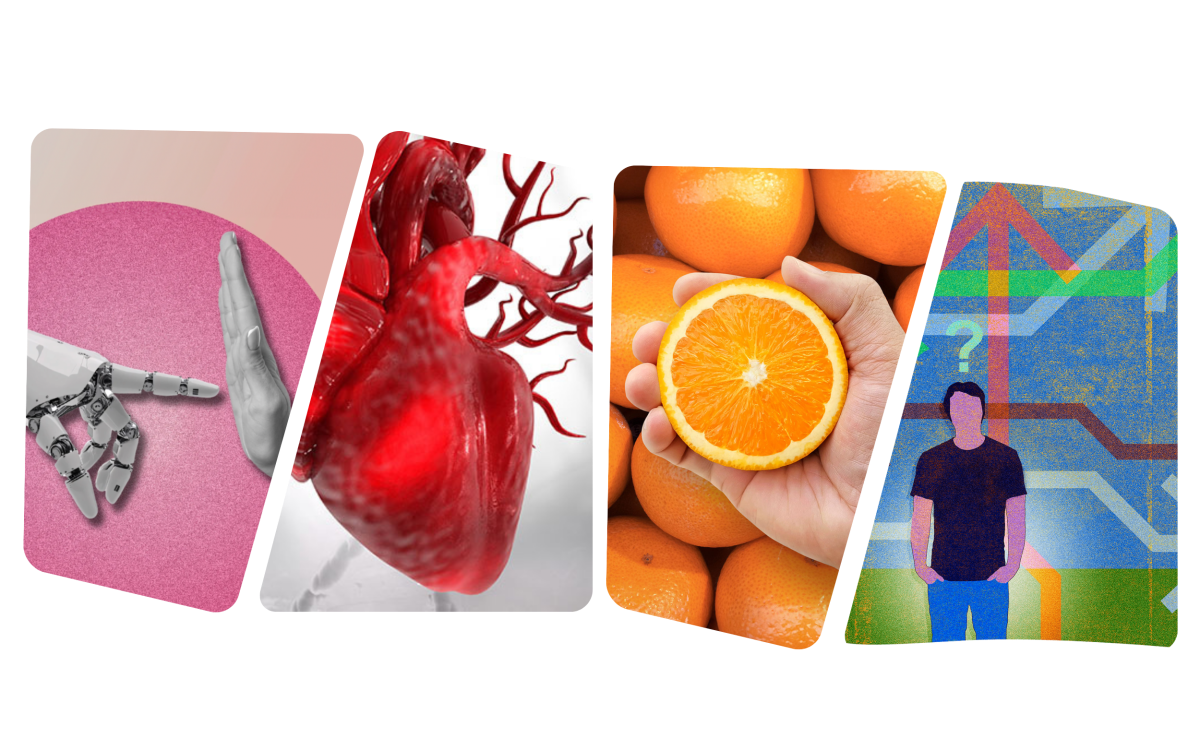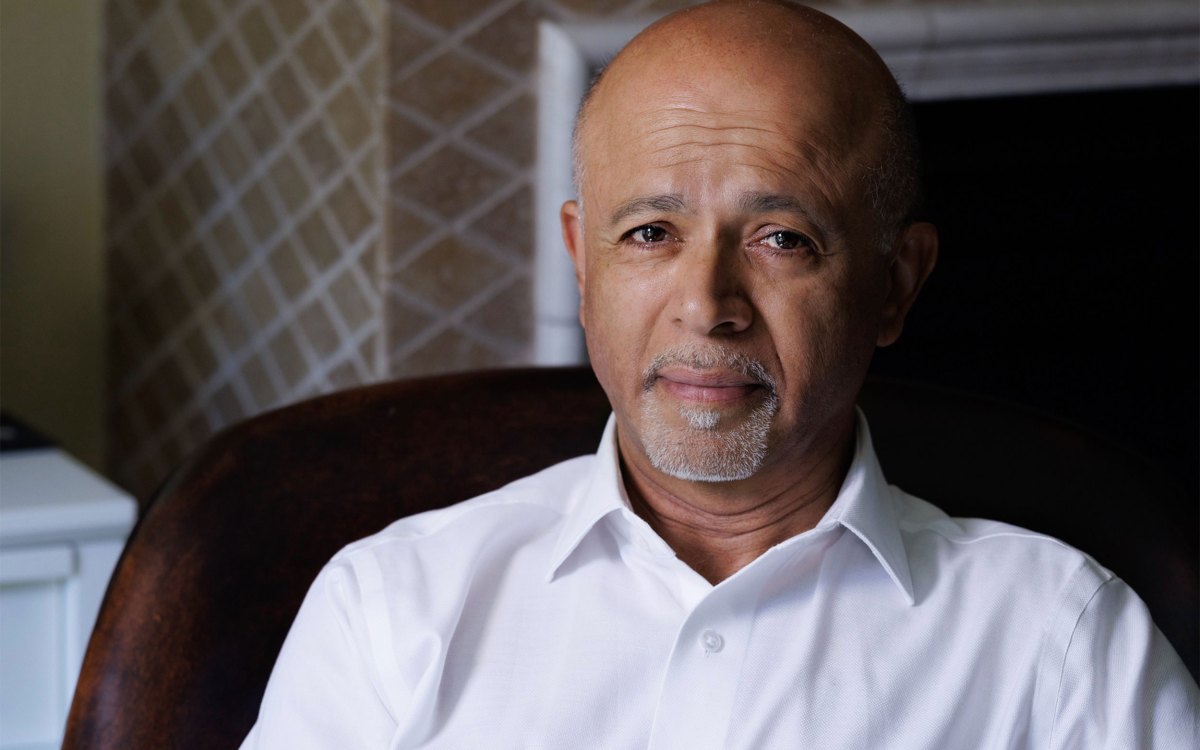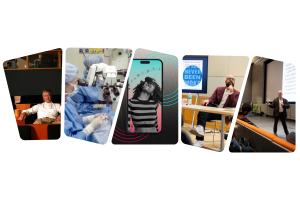Campus & Community
-

5 things we learned this week
How closely have you been following the Gazette? Take our quiz to find out.
-

Donald Lee Fanger, 94
Memorial Minute — Faculty of Arts and Sciences
-

Atul Gawande named featured speaker for Harvard Alumni Day
Acclaimed surgeon, writer, and public health leader will take the stage at Harvard’s global alumni celebration on June 6
-

Sense of isolation, loss amid Gaza war sparks quest to make all feel welcome
Nim Ravid works to end polarization on campus, across multicultural democracies
-

4 things we learned this week
How closely have you been following the Gazette? Take our quiz to find out.
-

Abraham Verghese, physician and bestselling author, named Commencement speaker
Stanford professor whose novels include ‘Covenant of Water’ to deliver principal address May 29
-
These creatures see dusty duty
While the rarity and beauty of Harvard’s Glass Flowers have won them fame and made them the Harvard Museum of Natural History’s (HMNH) most popular exhibit, the glass animals exist…
-
Claims to antiquity
When Harvard’s founders committed themselves to a “learned ministry” for the New World, they could hardly have imagined study carrels with dataports or periodicals like Syzygy: Journal of Alternative Religion…
-
Long view needed in Afghanistan
The toughest problem facing the U.S.-led operation in Afghanistan is not bombs, bunkers, or refugees, but the depth of its own resolve, according to former Institute of Politics Director and former U.S. Ambassador to the United Nations Jonathan Moore.
-
Panel: Actions, not promises, key to peace
Laying the groundwork for an effective new national governmental infrastructure in Afghanistan will require a thoughtful, sustained, and integrated international effort.
-
Reading for the blind
Michele Shirasu-Hiza sits in what looks like a phone booth with the lights on, talking to herself.
-
Goodbye, Mr. Chips
If you asked most college students at most colleges to name their favorite class, chances are the words “freshman chemistry” wouldn’t come up all that often. On the other hand,…
-
Lithium drugs found to reduce suicide risk
SPECIAL TO THE GAZETTE 12/12/01 Lithium drugs may reduce the risk of suicide among people with severe recurrent depression by as much as 82 percent, according to a new Harvard…
-
Two Harvard students named 2002 Marshall Scholarship winners
SPECIAL TO THE GAZETTE 12/6/01 Lauren Baer and Sarah Moss, both Harvard College seniors, have won Marshall Scholarships. The prestigious scholarships allow young American leaders to study at a university…
-
Five Harvard students named 2002 Rhodes Scholarship winners
SPECIAL TO THE GAZETTE 12/10/01 Five Harvard University students were selected as Rhodes Scholars, giving Harvard the most scholars in the nation, the scholarship trust announced Sunday, Dec. 9. The…
-
The Big Picture
Make no bones about it: Charles Schaff loves his job.
-
Analysis: ‘Mad Cow’ not dire threat to U.S.
Bovine Spongiform Encephalopathy (BSE, or Mad Cow disease) has not been detected in the United States. The first major analysis of what would happen if BSE were introduced into the United States finds that there is little chance that the disease will be a serious threat either to the American cattle herd or to public health. The work was done for the U.S. Department of Agriculture by the Harvard Center for Risk Analysis (HCRA), part of the School of Public Health (SPH).
-
Francis Daniels Moore dies at 88
Francis Daniels Moore, former surgeon-in-chief at Brigham and Womens Hospital (BWH) and the Moseley Professor of Surgery Emeritus at Harvard Medical School (HMS), died on Nov. 24 at the age of 88. In 1954, Moore was a member of the surgical team that performed the worlds first successful human organ transplant – the transference of a kidney between identical twins.
-
-
Making a life in the arts
Jack Megan, the new director of the Office of the Arts (OFA), is a multitalented artist in his own right. A jazz pianist, composer, actor, and playwright, he has been a passionate devotee of the arts since childhood.
-
Juggling career and family, the Radcliffe perspective
Find a nanny. Have a Plan B. Redefine success. Keep your priorities clear. Be flexible. Be creative. Laugh.
-
Film follows rookie teachers in L.A.
Kindergarten teacher Maurice Rabb spends his evenings coordinating speech therapy for a student. Joy Kraft, a high school social studies teacher, wheels her teaching materials from classroom to classroom in a suitcase. Nate Monley takes a student fishing to gain his trust. Georgene Acosta rallies her English as a Second Language students to testify before the school board. Geneviève DeBose reaches out to a troubled student, only to lose him.
-
Early action numbers hit a plateau
While a record 6,128 students applied for admission under the Colleges early action program this year, applications have remained just over the 6,000 level for the third year in a row. Last year, 6,096 applied early, while the previous year saw 6,026 applicants.
-
Clinton gets warm reception
A festive mood and spirited audience welcomed former U.S. President Bill Clinton to Gordon Track on Monday (Nov. 19), providing a counterpoint to the serious issues of globalization and terrorism that he addressed in his 45-minute speech.
-
In Brief
Need to get notes– couldnt save from quark file
-
Police reports
Following are some of the incidents reported to the Harvard University Police Department (HUPD) for the week ending Saturday, Nov. 24. The official log is located at 29 Garden St.
-
President holds office hours
President Lawrence H. Summers will hold office hours for students in his Massachusetts Hall office from 4 to 5 p.m. on the following dates: Nov. 29 Dec. 13 Feb. 1,…
-
Widener reading room is ready
On Nov. 16, the Widener Library Periodicals Reading Room opened in its new location on the first floor of the library. The room features comfortable seating, HOLLIS terminals, onsite staff, and a selection of the more heavily consulted periodicals and newspapers. Wideners current, unbound journal collection will be housed in the adjacent stacks for easy access. The refurbishment of the Periodicals Reading Room is a part of the Widener Stacks Renovation project.
-
Edmund Spevack, former Harvard lecturer, dies at 38
Edmund Spevack, a former Harvard lecturer on history and literature, passed away in his native Muenster, Germany, on July 2, 2001, after a lengthy battle with cancer. He was 38.
-
Professor missing, reward offered
Professor Don C. Wiley, John O. Loeb Professor of Biochemistry and Biophysics, has been reported missing by the Memphis, Tenn., police since Nov. 16. Wiley, in Memphis attending a board meeting of the St. Jude Childrens Research Hospital, was last seen the evening of Nov. 15. His car was discovered the morning of Nov. 16, parked on a bridge over the Mississippi River. Memphis law enforcement officials report no evidence of foul play. FBI officials are monitoring the investigation, and Harvard remains in daily contact with law enforcement members. Wiley, a pre-eminent structural biologist, has conducted key research on the structure of viruses and proteins in the human immune system. In 1999, Wiley and Jack Strominger, Higgins Professor of Biochemistry, won the prestigious Japan Prize for their discoveries of how the immune system protects humans from infections. In 1995, Wiley and Strominger won Albert Lasker Medical Research Awards for their work on the immune system. A $10,000 reward for information related to Wileys disappearance has been made possible by contributions from Harvard and St. Jude Childrens Research Hospital.
-
Toddling toward the birth of knowledge
Elizabeth Spelke was surprised to discover how much infants know about whats going on around them. The newly tenured professor of psychology was just as surprised by their limits. In some situations, counting, for example, babies act more like monkeys, rats, or pigeons than humans.
-
Franken’s scattershot scores
I apologize if I offended you.
-
Newsmakers
Bell wins Ramsey Medal
-
PBH launches annual gift drive
Phillips Brooks House (PBH) will launch its annual Holiday Gift Drive this week, with organizers expecting the drive to bring in more than 1,000 gifts for children and teenagers in Cambridge and Boston.
-
The Big Picture
As any performer will tell you, getting out there in front of an audience never gets easier. There are always the butterflies in the stomach, the fear your voice will crack or that youll trip over your shoelaces and land on your keester.
-
Small income boost increases children’s social skills
A small amount of money can make a big difference for young children from poor families by increasing their social skills and readiness for school to levels seen in children from middle-class families, according to a new study by researchers at the Graduate School of Education (GSE) and Baylor University.


